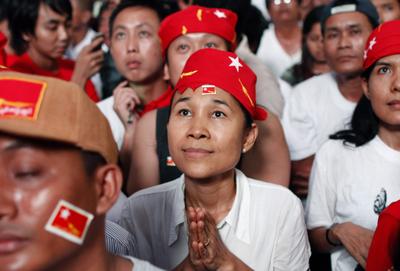This, combined with an entrenched position in the political architecture that preserves their institutional autonomy and influence, has encouraged the Myanmar military (Tatmadaw) to play a back-stage and non-disruptive role so far in the democratic reform process. Eliminating avenues of military interference is a necessary condition for such reform, but by itself it will not guarantee Myanmar’s democratic future.
The adoption of the 2008 Constitution, which mandated the creation of a parliament, legalised political participation, and instigated regularly held elections, has fundamentally altered the ways in which power in Myanmar is accessed and wielded. This has transformed Myanmar’s political system from a military junta to a presidential republic. Despite the implementation of these changes, orchestrated by the outgoing State Peace and Development Council (SPDC), victory of the SPDC’s surrogate, the Union Solidarity and Development Party (USDP), was still assured in the 2010 elections. This phenomenon is best described as a change in, but not of, the ruling regime, due to the large continuation of personalities running the state, but now within a more diverse group of entities beyond the formal military itself.
The Tatmadaw share more linkages with the USDP than with any other political entity. But the USDP is not simply a proxy under military tutelage; it is a political force in its own right with an interest in maintaining its position of power. With the military largely content governing its own affairs there is a growing power struggle within the USDP between President Sein (former SPDC Prime Minister) and Union Speaker Thura Shwe Mann (former number three in the SPDC). This tension specifically concerns the division of responsibilities between cabinet and parliament, an issue which will affect the entire political system.
It seems that President Sein will not run for election in 2015. Meanwhile Mann has indicated such an interest. Therefore, the two leaders will potentially have different motivations and tactics in relation to actioning further reforms. If President Sein has already decided not to seek re-election, he may try to accelerate reforms so as to entrench his legacy as a reformer and deflect any criticism or attempts to hold him to account for his participation in the previous SPDC regime. For Mann, however, his activism may cede to the goal of positioning himself and the USDP for victory. A landslide victory for Aung San Suu Kyi’s National League for Democracy (NLD) party has been predicted, and, if the 2012 April by-elections are any indication, the USDP is most likely facing not just electoral defeat but annihilation. The USDP, therefore, has a choice: either work to reform aspects of the system from within to improve the USDP’s chances of success or manipulate the electoral system in a similar manner as in the 2010 elections, but in far more discrete ways to avoid public and international retaliation.
The parliamentary committee responsible for making recommendations regarding the constitutional reforms by the end of the year is an important avenue through which these decisions will unfold. Much commentary on constitutional change is focused on removing the privileges and political role mandated to the military, but the most likely changes are to come from a bargaining process between the USDP and the opposition parties, specifically the NLD. For the NLD, the qualifications of candidates for the presidency is a concern as under the current rules Aung San Suu Kyi is barred from the office because she was married to a foreigner. Meanwhile, the USDP may lobby to replace the first-past-the-post system with a proportional representative system due to the distorted results expected for the NLD, like in the April 2012 by-elections. Other entities shall also be involved in these negotiations between the two parties, including ethnic parties lobbying for greater autonomy for their regions.
For reformers, the long-term goal should be the creation and entrenchment of democratic institutions, responsibilities and norms that strengthen the system’s growing permanence and resistance to entities trying to alter it for their own idiosyncratic benefit. For the short term, however, these motivations are creating the political space and landscape necessary for such a system to take root. The USDP stands at a crossroads of whether to continue the democratic reform agenda or use its dominant position to dilute the democratic substance of these structures to ensure its continued rule. The 2015 election will be a test not only of the generals’ willingness to respect the results regardless of who wins but whether the USDP will be willing to admit defeat and assume a new role as opposition. Therefore, the fulfillment of Myanmar’s democratic project remains threatened by the possible entrenchment of a new authoritarian system; a system not defined by force but by the manipulation of democratic structures.
Adam P. MacDonald is an independent researcher based in Halifax, Canada.

